202 books about Modernism (Literature) and 9
start with F
202 books about Modernism (Literature) and 9
202 books about Modernism (Literature)
9 start with F start with F
9 start with F start with F
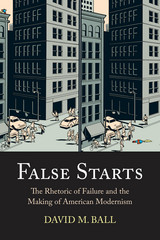
False Starts
The Rhetoric of Failure and the Making of American Modernism
David M. Ball
Northwestern University Press, 2014
From Herman Melville’s claim that “failure is the true test of greatness” to Henry Adams’s self-identification with the “mortifying failure in [his] long education” and William Faulkner’s eagerness to be judged by his “splendid failure to do the impossible,” the rhetoric of failure has served as a master trope of modernist American literary expression. David Ball’s magisterial study addresses the fundamental questions of language, meaning, and authority that run counter to well-rehearsed claims of American innocence and positivity, beginning with the American Renaissance and extending into modernist and contemporary literature. The rhetoric of failure was used at various times to engage artistic ambition, the arrival of advanced capitalism, and a rapidly changing culture, not to mention sheer exhaustion. False Starts locates a lively narrative running through American literature that consequently queries assumptions about the development of modernism in the United States.
[more]
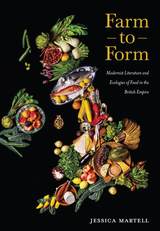
Farm to Form
Modernist Literature and Ecologies of Food in the British Empire
Jessica Martell
University of Nevada Press, 2020
In this groundbreaking book, Jessica Martell investigates the relationship between industrial food and the emergence of literary modernisms in Britain and Ireland. By the early twentieth century, the industrialization of the British Empire’s food system had rendered many traditional farming operations, and attendant agrarian ways of life, obsolete. Weaving insights from modernist studies, food studies, and ecocriticism, Farm to Form contends that industrial food made nature “modernist,” a term used as literary scholars understand it—stylistically disorienting, unfamiliar, and artificial but also exhilarating, excessive, and above all, new. Martell draws in part upon archives in the United Kingdom but also presents imperial foodways as an extended rehearsal for the current era of industrial food supremacy. She analyzes how pastoral mode, anachronism, fragmentation, and polyvocal narration reflect the power of the literary arts to reckon with—and to resist—the new “modernist ecologies” of the twentieth century.
Deeply informed by Martell’s extensive knowledge of modern British, Irish, American, and World Literatures, this progressive work positions modernism as central to the study of narratives of resistance against social and environmental degradation. Analyzed works include those of Thomas Hardy, E. M. Forster, Virginia Woolf, Joseph Conrad, George Russell, and James Joyce.
In light of climate change, fossil fuel supremacy, nutritional dearth, and other pressing food issues, modernist texts bring to life an era of crisis and anxiety similar to our own. In doing so, Martell summons the past as a way to employ the modernist term of “defamiliarizing” the present so that entrenched perceptions can be challenged. Our current food regime is both new and constantly evolving with the first industrial food trades. Studying earlier cultural responses to them invites us to return to persistent problems with new insights and renewed passion.
Deeply informed by Martell’s extensive knowledge of modern British, Irish, American, and World Literatures, this progressive work positions modernism as central to the study of narratives of resistance against social and environmental degradation. Analyzed works include those of Thomas Hardy, E. M. Forster, Virginia Woolf, Joseph Conrad, George Russell, and James Joyce.
In light of climate change, fossil fuel supremacy, nutritional dearth, and other pressing food issues, modernist texts bring to life an era of crisis and anxiety similar to our own. In doing so, Martell summons the past as a way to employ the modernist term of “defamiliarizing” the present so that entrenched perceptions can be challenged. Our current food regime is both new and constantly evolving with the first industrial food trades. Studying earlier cultural responses to them invites us to return to persistent problems with new insights and renewed passion.
[more]
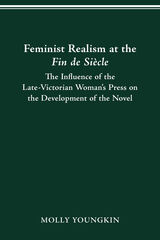
FEMINIST REALISM AT THE FIN DE SIÈCLE
The Influence of the Late-Victorian Woman's Press on the Development of the Novel
MOLLY YOUNGKIN
The Ohio State University Press, 2007
Molly Youngkin takes on a major literary problem of the turn-of-the-century: Was the transition from the Victorian novel to the modern novel enabled by antirealist or realist narrative strategies? To answer this question, Youngkin analyzes book reviews that appeared in two prominent feminist periodicals circulated during the late-Victorian era—Shafts and The Woman’s Herald.
Through reviews of the works of important male and female authors of the decade—Thomas Hardy, Sarah Grand, George Gissing, Mona Caird, George Meredith, Ménie Dowie, George Moore, and Henrietta Stannard—these periodicals developed a feminist realist aesthetic that drew on three aspects of woman’s agency (consciousness, spoken word, and action) and emphasized corresponding narrative strategies (internal perspective, dialogue, and description of characters’ actions). Still, these periodicals privileged consciousness over spoken word and action and, by doing so, encouraged authors to push the boundaries of traditional realism and anticipate the modernist aesthetic.
By acknowledging the role of the woman’s press in the development of the novel, this book revises our understanding of the transition from Victorianism to modernism, which often is characterized as antirealist. Late-Victorian authors working within the realist tradition also contributed to this transition, particularly through their engagement with feminist realism. Youngkin deftly illustrates this transition and in so doing proves that it cannot be attributed to antirealist narrative strategies alone.
[more]

Fiction, Crime, and Empire
CLUES TO MODERNITY AND POSTMODERNISM
Jon Thompson
University of Illinois Press, 1993
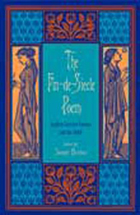
The Fin-de-Siecle Poem
English Literary Culture and the 1890s
Joseph Bristow
Ohio University Press, 2005
Featuring innovative research by emergent and established scholars, The Fin-de-Siecle Poem throws new light on the remarkable diversity of poetry produced at the close of the nineteenth century in England. Opening with a detailed preface that shows why literary historians have frequently underrated fin-de-siecle poetry, the collection explains how a strikingly rich body of lyrical and narrative poems anticipated many of the developments traditionally attributed to Modernism. Each chapter in turn provides insights into the ways in which late-nineteenth-century poets represented their experiences of the city, their attitudes toward sexuality, their responses to empire, and their interest in religious belief.
The eleven essays presented by editor Joseph Bristow pay renewed attention to the achievements of such legendary writers as Oscar Wilde, John Davidson, Ernest Dowson, Lionel Johnson, and W.B. Yeats, whose careers have always been associated with the 1890s. This book also explores the lesser-known but equally significant advances made by notable women poets, including Michael Field, Amy Levy, Charlotte Mew, Alice Meynell, A. Mary F. Robinson, and Graham R. Tomson.
The Fin-de-Siecle Poem brings together innovative research on poetry that has been typecast as the attenuated Victorianism that was rejected by Modernism. The contributors underscore the remarkable innovations made in English poetry of the 1880s and 1890s and show how woman poets stood shoulder-to-shoulder with their better-known male contemporaries.Joseph Bristow is professor of English at the University of California, Los Angeles, where he edits the journal Nineteenth-Century Literature. His recent books include The Cambridge Companion to Victorian Poetry, Oscar Wilde: Contextual Conditions, and the variorum edition of Oscar Wilde's The Picture of Dorian Gray.
The eleven essays presented by editor Joseph Bristow pay renewed attention to the achievements of such legendary writers as Oscar Wilde, John Davidson, Ernest Dowson, Lionel Johnson, and W.B. Yeats, whose careers have always been associated with the 1890s. This book also explores the lesser-known but equally significant advances made by notable women poets, including Michael Field, Amy Levy, Charlotte Mew, Alice Meynell, A. Mary F. Robinson, and Graham R. Tomson.
The Fin-de-Siecle Poem brings together innovative research on poetry that has been typecast as the attenuated Victorianism that was rejected by Modernism. The contributors underscore the remarkable innovations made in English poetry of the 1880s and 1890s and show how woman poets stood shoulder-to-shoulder with their better-known male contemporaries.Joseph Bristow is professor of English at the University of California, Los Angeles, where he edits the journal Nineteenth-Century Literature. His recent books include The Cambridge Companion to Victorian Poetry, Oscar Wilde: Contextual Conditions, and the variorum edition of Oscar Wilde's The Picture of Dorian Gray.
[more]

First Love
The Affections of Modern Fiction
Maria DiBattista
University of Chicago Press, 1991
All of us remember our First Love. In this brilliant and often passionate book, Maria DiBattista shows that the yearning for the freshness of First Love, and the sadness of that yearning, are central to modern literature. DiBattista offers a sweeping and wholly original reinterpretation of modern fiction, allowing us to see the romantic affections that lie behind the seemingly most ironic of modernist texts.
DiBattista argues that modernity reinvented First Love as a myth of creative initiative, as its characteristic response to a pervasive sense of historical belatedness. Anxious that its own creations can never be more than diminished forms of mightier originals, modernity idolizes First Love as the beginning that can never be repeated. First Love hence epitomizes the dream of a new self-incarnation. From Turgenev's First Love to the formative works of Virginia Woolf, Gertrude Stein, E. M. Forster, and Vladimir Nabokov, First Love confirms the birth of an artistic vocation. For modern men and women intent on becoming the original authors of their own lives, First Love becomes paradigmatic of those life-altering moments that transform the undifferentiated sequence of days into a fateful narrative.
DiBattista focuses on the enunciation of First Love in the fiction of Thomas Hardy, D. H. Lawrence, James Joyce, and Samuel Beckett. In reading their works, DiBattista dramatically revises the accepted view of irony as the dominant tone of modernism. First Love constitutes, she shows, a new apprehension of the world characterized not by the frigid distances of irony but by a belief in the creative individual who may begin the world anew, as if for the first time.
DiBattista argues that modernity reinvented First Love as a myth of creative initiative, as its characteristic response to a pervasive sense of historical belatedness. Anxious that its own creations can never be more than diminished forms of mightier originals, modernity idolizes First Love as the beginning that can never be repeated. First Love hence epitomizes the dream of a new self-incarnation. From Turgenev's First Love to the formative works of Virginia Woolf, Gertrude Stein, E. M. Forster, and Vladimir Nabokov, First Love confirms the birth of an artistic vocation. For modern men and women intent on becoming the original authors of their own lives, First Love becomes paradigmatic of those life-altering moments that transform the undifferentiated sequence of days into a fateful narrative.
DiBattista focuses on the enunciation of First Love in the fiction of Thomas Hardy, D. H. Lawrence, James Joyce, and Samuel Beckett. In reading their works, DiBattista dramatically revises the accepted view of irony as the dominant tone of modernism. First Love constitutes, she shows, a new apprehension of the world characterized not by the frigid distances of irony but by a belief in the creative individual who may begin the world anew, as if for the first time.
[more]
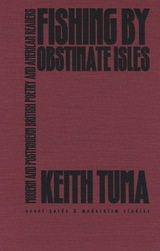
Fishing by Obstinate Isles
Modern and Postmodern British Poetry and American Readers
Keith Tuma
Northwestern University Press, 1998
Fishing by Obstinate Isles explores the relations of recent British and American poetries, challenging American views of a British poetry dominated by antimodernism while discussing the role of rhetorics of national identity on both sides of the Atlantic in the persistence of these views. Devoting its most extensive commentary to a collection of British modernist and postmodernist poets, it attacks the relegation of British poetry to the zones of the quaint, making a compelling case for renewed engagements with fields of British poetry deserving of attention.
[more]
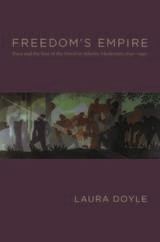
Freedom's Empire
Race and the Rise of the Novel in Atlantic Modernity, 1640-1940
Laura Doyle
Duke University Press, 2007
In this pathbreaking work of scholarship, Laura Doyle reveals the central, formative role of race in the development of a transnational, English-language literature over three centuries. Identifying a recurring freedom plot organized around an Atlantic Ocean crossing, Doyle shows how this plot structures the texts of both African-Atlantic and Anglo-Atlantic writers and how it takes shape by way of submerged intertextual exchanges between the two traditions. For Anglo-Atlantic writers, Doyle locates the origins of this narrative in the seventeenth century. She argues that members of Parliament, religious refugees, and new Atlantic merchants together generated a racial rhetoric by which the English fashioned themselves as a “native,” “freedom-loving,” “Anglo-Saxon” people struggling against a tyrannical foreign king. Stories of a near ruinous yet triumphant Atlantic passage to freedom came to provide the narrative expression of this heroic Anglo-Saxon identity—in novels, memoirs, pamphlets, and national histories. At the same time, as Doyle traces through figures such as Friday in Robinson Crusoe, and through gothic and seduction narratives of ruin and captivity, these texts covertly register, distort, or appropriate the black Atlantic experience. African-Atlantic authors seize back the freedom plot, placing their agency at the origin of both their own and whites’ survival on the Atlantic. They also shrewdly expose the ways that their narratives have been “framed” by the Anglo-Atlantic tradition, even though their labor has provided the enabling condition for that tradition.
Doyle brings together authors often separated by nation, race, and period, including Aphra Behn, Eliza Haywood, Olaudah Equiano, Nathaniel Hawthorne, Harriet Wilson, Pauline Hopkins, George Eliot, and Nella Larsen. In so doing, she reassesses the strategies of early women novelists, reinterprets the significance of rape and incest in the novel, and measures the power of race in the modern English-language imagination.
[more]
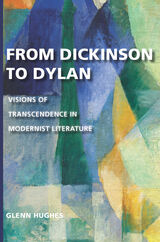
From Dickinson to Dylan
Visions of Transcendence in Modernist Literature
Glenn Hughes
University of Missouri Press, 2020
Glenn Hughes examines the ways in which six literary modernists—Emily Dickinson, Marcel Proust, T. S. Eliot, Ezra Pound, Samuel Beckett, and Bob Dylan—have explored the human relationship to a transcendent mystery of meaning. Hughes argues that visions of transcendence are, perhaps surprisingly, a significant feature in modernist literature, and that these authors’ works account for many of the options for interpreting what transcendent reality might be.
This work is unique in its extended focus, in a comparative study spanning a century, on the persistence and centrality in modernist literature of the struggle to understand and articulate the dependence of human meaning on the mystery of transcendent meaning. Hughes shows us that each of these authors is a mystic in his or her way, and that none are tempted by the modern inclination to suppose that meaning originates with human beings. Together, they address one of the most difficult and important challenges of modern literature: how to be a mystic in modernity.
This work is unique in its extended focus, in a comparative study spanning a century, on the persistence and centrality in modernist literature of the struggle to understand and articulate the dependence of human meaning on the mystery of transcendent meaning. Hughes shows us that each of these authors is a mystic in his or her way, and that none are tempted by the modern inclination to suppose that meaning originates with human beings. Together, they address one of the most difficult and important challenges of modern literature: how to be a mystic in modernity.
[more]
READERS
Browse our collection.
PUBLISHERS
See BiblioVault's publisher services.
STUDENT SERVICES
Files for college accessibility offices.
UChicago Accessibility Resources
home | accessibility | search | about | contact us
BiblioVault ® 2001 - 2024
The University of Chicago Press









